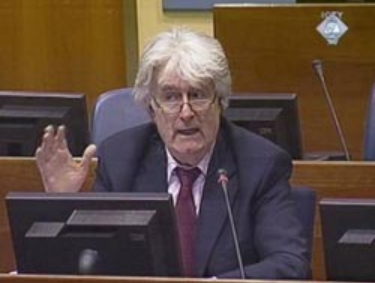|
Addressing the International Criminal Tribunal for the former Yugoslavia, the 64-year-old said he would use his trial "to defend the greatness" of the Bosnian Serb nation which had been endured centuries of persecution.
"I will defend that nation of ours and their cause that is just and holy," said Karadzic as he made his opening statement from the dock in The Hague.
Karadzic stands charged as the "supreme commander" of an cleansing campaign targeting Muslims and Croats in the Bosnian war that claimed 100,000 lives and displaced 2.2 million people.
Prosecutors say Karadzic led a genocidal campaign to make Bosnian Muslims "disappear from the face of the earth" and carve out a mono-ethnic state for Bosnian Serbs.
He appeared in a dark suit and spoke in Serbian as his comments were translated by a court interpreter.
"Greater Serbia"
He outlined his defence to 11 counts of genocide, war crimes and crimes against humanity in an opening statement scheduled to be delivered over two days. He has pleaded not guilty.
Karadzic is accused of having colluded with the late Yugoslav leader Slobodan Milosevic in plotting the creation of a "Greater Serbia" that was to include 60 percent of Bosnian territory. Serbs made up about one-third of Bosnia's population.
He told the judges that "there never was any intention, any idea, let alone plan, to expel Muslims and Croats from the (self-proclaimed Bosnian Serb state) Republika Srpska.
"The Serbs were not engaged in action, they were engaged in reaction."
Blaming the Muslim leadership for causing the war by insisting on creating a sovereign and independent Bosnia, Karadzic told the court: "The Serbs were the party that made concessions for the sake of preserving peace and they were never in favour of a war solution."
This case is about that supreme commander, a man who harnessed the forces of nationalism, hatred and fear to implement his vision of an ethnically separated Bosnia: Radovan Karadzic," prosecutor Alan Tieger told the court when the trial opened last year.
"One of humanity's darkest chapters"
He responded that Serbs had acted legitimately to "provocations" from the enclaves of Srebrenica and Zepa.
Often referring to himself in the third person as "Dr Karadzic", the accused presented an array of videos and documents to the court as "evidence" of his contentions, working from a computer screen on a desk in front of him in the dock.
Karadzic had refused to attend the opening of his trial last October, insisting on more time to prepare his case and causing a four-month delay.
Arrested on a Belgrade bus in July 2008 after 13 years on the run, he faces life imprisonment.
Karadzic had sought a new delay of his trial until June 17 after concluding his opening statement to study an additional 400,000 pages of prosecution evidence he claims have been filed since October.
His request was refused by the court which ruled last Friday that the first prosecution witness will testify on Wednesday.
Mindful of the way that the late former Serbian president Slobodan Milosevic was able to drag out his war crimes trial at the Hague, the court has told Karadzic that London barrister Richard Harvey will take over as his lawyer if he boycotts or obstructs proceedings.
A key incident that prosecutors are expected to focus on is the killing of more than 7,000 Bosnian Muslim men and boys in the village of Srebrenica in July 1995, where they accuse Karadzic of orchestrating one of "humanity's darkest chapters".
They also accuse him of responsibility for the 43-month siege of Sarajevo, in which some 10,000 people died.
Survivors showed up in The Hague on Monday to press for justice.
"We are here today to tell the whole world that victims are still alive and we are waiting for the truth and for justice," said Melina Hadziselimovic of the Mothers of Srebrenica.
What happened in Sarajevo?
Serb troops laid siege to the Bosnian capital Sarajevo from August 1994 to the end of the Bosnian war in November 1995.
The troops shelled the city and directed sniper fire against civilians as they queued for bread, went to markets or walked with their children.
According to human rights organisations, some 10,000 civilians, including 1,500 children, died in the 44-month siege of Sarajevo -- the longest such blockade in Europe since the end of World War II.
World Bulletin
